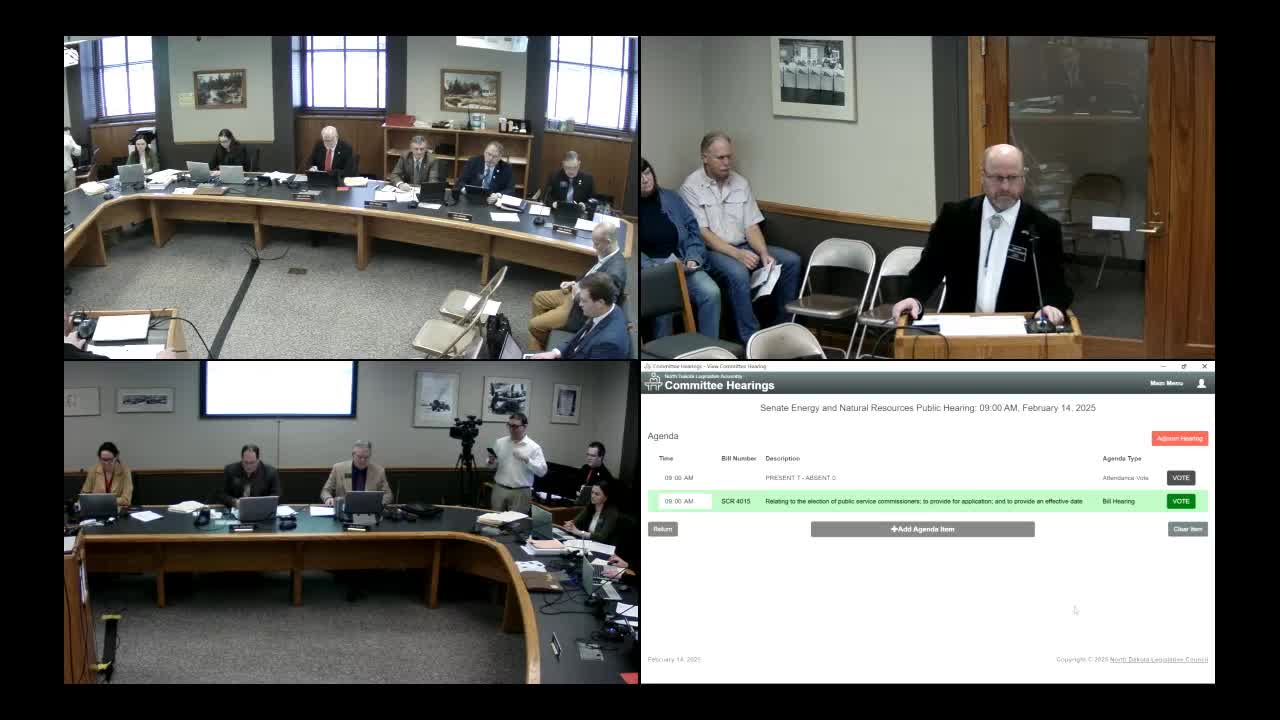Committee hears proposal to change Public Service Commission from three at-large seats to five district seats
Get AI-powered insights, summaries, and transcripts
Subscribe
Summary
Senate Concurrent Resolution 4015 would put before voters a constitutional amendment to replace the current three-member, at-large Public Service Commission with five commissioners elected from single-member districts.
Senate Concurrent Resolution 4015, a proposal to put a constitutional amendment on the ballot to change how the North Dakota Public Service Commission (PSC) is chosen, drew an extended hearing before the Senate Energy and Natural Resources Committee.
Senator Jeff Magram, senator for District 8 and sponsor of the resolution, told the committee that the measure would remove the constitutionally mandated three-member, at-large commission and replace it with a five-member commission elected from five compact, contiguous districts and serving four-year terms. “Senate concurrent resolution 4015 is a resolution to put on the ballot to change the makeup of the public service commission from a 3 member board elected at large to a 5 member board elected in districts,” Magram said.
Supporters told the committee the change is intended to expand geographic representation on the PSC after recent high-profile energy matters. Lanny Kenner, who identified himself as District 7, testified that “to have the voices heard from a large variation of different parts of the state, we need to have 5 districts with 1 public service commissioner elected from each of the districts.” Curtis Junt, testifying online from a long energy-industry career, said he has seen “the will of the people has not been represented through the PSC” and described concerns about appointments and recusals during contested pipeline proceedings.
Why it matters: sponsors said a five-district PSC would give communities in the East, West and central parts of the state a commissioner who must answer to local voters, rather than three officials elected at large who, supporters argue, tend to be concentrated in the Bismarck area. Magram and other witnesses tied the proposal to local experience with controversial pipeline permitting and to perceptions that the current commission’s decisions did not reflect local opposition.
Committee members questioned practical details. Chairman Patton disputed one factual claim in testimony that the pipeline in question was “primarily Chinese owned,” saying ownership is split among many entities including U.S.-based and South Korean investors. Senators asked how initial district lines would be drawn and whether population-only criteria would produce small, city-centered districts such as a single Fargo district. Magram noted the resolution would require the legislative assembly to draw districts based on population after each decennial census and that the legislative assembly must make districts “as practicable that every elector is equal.”
Committee members also raised logistical concerns about residency requirements for commissioners who would be expected to do commission work in the capital. Magram responded that commissioners would have to be residents of their districts but would commute to Bismarck for commission business and that practical arrangements (housing allowance, remote work options) could be addressed if the measure passes. Several senators pressed whether district-based elections would reduce or shift voters’ influence; Magram compared the proposal to legislative districts and said district commissioners would be more accountable to their local constituents.
The hearing drew multiple proponents from across the state who urged the committee to give the resolution a “do pass” recommendation so voters could decide on the constitutional change. No formal committee vote on SCR 4015 was recorded in the transcript; the committee closed the hearing and moved on to other agenda items.
The committee did not take final action on the resolution during the hearing; sponsors asked for a due-pass recommendation to let the measure reach the ballot, and multiple senators said they needed more detail on districting mechanics and fiscal implications before a vote.
Provenance: topic introduced at transcript block starting at 417.83 with Senator Jeff Magram’s opening remarks; topic discussion and public testimony continue through the online testimony from Curtis Junt and in-room supporters, concluding when the committee closed the hearing and moved to other bills.
